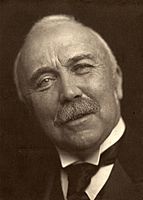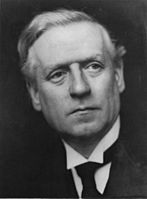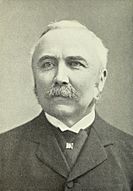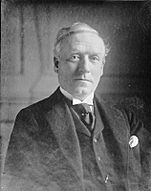Liberal government, 1905–1915 facts for kids
The Liberal government in the United Kingdom of Great Britain and Ireland lasted from 1905 to 1915. It was led by two different Prime Ministers. First, Henry Campbell-Bannerman was in charge from 1905 to 1908. After him, H. H. Asquith took over and led the government until 1915.
Contents
How the Government Started
In December 1905, the Conservative government led by Arthur Balfour ended. The Liberals, led by Sir Henry Campbell-Bannerman, were then asked to form a new government.
They won a huge number of seats in the election that followed. This gave them a very strong majority. In 1908, Sir Henry Campbell-Bannerman stepped down, and H. H. Asquith became the new Prime Minister.
Important Changes and Policies
The Liberal government had the support of 29 Labour Party members of parliament (MPs). A key figure was David Lloyd George, who was in charge of the country's money (the Chancellor). He created something called the People's Budget.
This budget helped bring in many new laws to improve people's lives. For example, they introduced:
- Old age pensions: This meant that older people could get a regular payment from the government. Before this, many elderly people faced the scary thought of ending up in a workhouse if they couldn't work.
- Unemployment insurance: This gave money to a large number of working people if they lost their jobs.
These changes were a big deal for many working families. They offered a safety net that hadn't existed before.
Another very important law was the Parliament Act 1911. This act changed how laws were made:
- It took away the power of the House of Lords to completely stop new laws. This meant that the House of Commons became the main place where laws were made.
- It made it a rule that the House of Lords could not reject laws about money. They had tried to do this in 1909, but now it was against the law.
- It shortened how long a Parliament could last, from seven years to five years.
Not everyone in Asquith's government agreed with these social changes. Some Liberals still believed in older ideas about how the government should work. However, most members of the government supported these new social reforms. They wanted to fix problems in society using new laws.
The End of the Government
The Liberal government lost some support in the two general elections of 1910. But they managed to stay in power because they got help from the Irish Parliamentary Party.
When the First World War started, the government faced some problems. There was a big failure in a military plan called the Dardanelles Campaign. Because of these issues, Prime Minister Asquith had to bring the Unionists into the government. This created a new type of government called a coalition.
Government Leaders
Campbell-Bannerman's Time in Office
Quick facts for kids Campbell-Bannerman ministry |
|
|---|---|
| 1905–1908 | |

Campbell-Bannerman
|
|
| Date formed | 5 December 1905 |
| Date dissolved | 5 April 1908 |
| People and organisations | |
| Monarch | Edward VII |
| Prime Minister | Sir Henry Campbell-Bannerman |
| Member party | Liberal Party |
| Status in legislature |
|
| Opposition party | Conservative Party |
| Opposition leaders |
|
| History | |
| Election(s) | 1906 general election |
| Legislature term(s) |
|
| Predecessor | Balfour ministry |
| Successor | First Asquith ministry |
Here are some of the main people in Campbell-Bannerman's government:
- Sir Henry Campbell-Bannerman – Prime Minister
- H. H. Asquith – Chancellor of the Exchequer (in charge of money)
- David Lloyd George – President of the Board of Trade (in charge of business and trade)
- Sir Edward Grey – Foreign Secretary (in charge of relations with other countries)
- Richard Haldane – Secretary of State for War (in charge of the army)
Changes in Campbell-Bannerman's Cabinet
A few changes happened during this time:
- In January 1907, Augustine Birrell became the Irish Secretary.
- In March 1907, Lewis Harcourt joined the cabinet.
Asquith's Time in Office
| Asquith ministries | |
|---|---|
|
|

Asquith (1908)
|
|
| Date formed |
|
| Date dissolved |
|
| People and organisations | |
| Monarch |
|
| Prime Minister | H. H. Asquith |
| Prime Minister's history | 1908–1916 |
| Member party | Liberal Party |
| Status in legislature |
|
| Opposition party | Conservative Party |
| Opposition leaders |
|
| History | |
| Election(s) | |
| Legislature term(s) |
|
| Budget(s) | People's Budget |
| Predecessor | C-Bannerman ministry |
| Successor | Asquith coalition ministry |
Here are some of the main people in Asquith's government:
- H. H. Asquith – Prime Minister
- David Lloyd George – Chancellor of the Exchequer
- Winston Churchill – Held several important roles, including Home Secretary and First Lord of the Admiralty.
- Sir Edward Grey – Foreign Secretary
- Reginald McKenna – Also held several roles, including First Lord of the Admiralty and Home Secretary.
- Lord Kitchener – Secretary for War during World War I.
Changes in Asquith's Cabinet
Asquith's government saw many changes over the years. Key shifts included:
- In February 1910, Winston Churchill became Home Secretary.
- In October 1911, Churchill moved to become First Lord of the Admiralty, and Reginald McKenna became Home Secretary.
- In June 1912, the Attorney-General, Sir Rufus Isaacs, joined the cabinet.
- In August 1914, as World War I began, Lord Kitchener became the Secretary for War.
See also
 | Percy Lavon Julian |
 | Katherine Johnson |
 | George Washington Carver |
 | Annie Easley |



